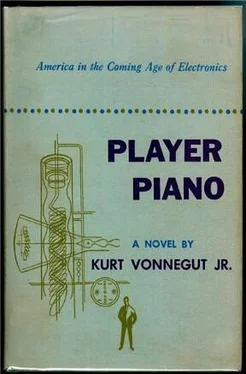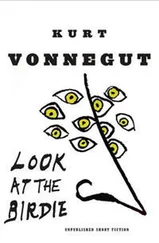"Raise your right hands," said the Indian. "Repeat after me the Oath of the Spirit of the Meadows. I solemnly swear by the voice in the pines -"
"By the voice in the pines," said the neophytes.
"By the lapping of the great blue water, by the whir of the eagle wing -"
The Old Man's plane had skated across the water to the shore on the other side of the island and was roaring its engines as it inched up a ramp onto land.
"By the growl of the summer thunder," said the Indian.
"By the growl of the summer thunder."
"I will uphold the Spirit of the Meadows," said the Indian. "I will obey the wise commands of my chiefs, for the good of the people. I will work and fight fearlessly, tirelessly for a better world. I will never say the job is done. I will uphold the honor of my profession and what I represent at all times. I will seek out enemies of the people, enemies of a better world for all children, relentlessly."
"Relentlessly!" said someone in the crowd near Paul, passionately. He turned to see that Luke Lubbock, again swept into the mainstream of pomp and circumstance, held his hand high and swore to everything that came along. In Luke's left hand was a fire extinguisher, apparently for use in case the blaze spread.
When the oath was done, the Indian looked and saw it was good. "The Spirit of the Meadows is pleased," he said. "The Meadows belong to these stout-hearted braves, and it shall be a proud, happy place as it was, lo, these many moons ago."
A smoke bomb concealed before him screened him for a startling instant, and he was gone.
"The saloon is open," said the loudspeaker. "The saloon is open, and will be open until midnight."
Paul found himself walking beside the pleasant youngster he'd met at lunch, Doctor Edmund Harrison of the Ithaca Works. Shepherd and Berringer were right behind, flattering the life out of Kroner.
"Well, how'd you like it, Ed?" said Paul.
Harrison looked at him searchingly, started to smile, and seemed to think it inadvisable. "Very well done," he said carefully. "Very professional."
"Jesus Christ," Berringer was saying, "I mean, Christ, boy, that was a show. You know, it's entertainment, and still you learn something, too. Christ! When you do both, that's art, boy. Christ, and that wasn't cheap to put on, either, I'll bet."
Ed Harrison of Ithaca stopped and picked up a bit of stone from the side of the path. "I'll be damned," he said. "An arrowhead!"
"A nice one, too," said Paul, admiring the relic.
"So there really were Indians on this island," said Harrison.
"For chrissakes, you crazy bastard," said Berringer. "You deaf, dumb, and blind? Whaddya think they been trying to tell you for the past half-hour?"
THE meeting of Doctors Paul Proteus, Anthony Kroner, Lou MacCleary, Executive Manager of National Industrial Security, and Francis Eldgrin Gelhorne, National Industrial, Commercial, Communications, Foodstuffs, and Resources Director, was to take place at the Meadows in the so-called Council House. The Council House was a frame building, away from the rest, that had been built in the old, wilder days as a lazaretto for surly drunks. Drinking at the Meadows had become more careful since the war - more mature, Kroner said - so the pesthouse fell into disuse and was finally converted into a meeting place for top-policy brass.
All save Doctor Gelhorne were now seated around a long meeting table, looking thoughtfully at the empty chair Gelhorne would be filling any minute. It was a time for silence. The mixing, the making of new contacts, the packing up of troubles in old kit bags went on noisily across the island, in the saloon. Here in the Council House there was no joy, only the summer-cottage aroma of mildew and incipient dry rot, and a grave awareness on the part of each of the three men that the world was their apple.
The shouts and songs that floated over the greensward from the saloon, Paul noted, had a piping quality. There wasn't the inimitable hoarseness of an honest-to-God drunk in the lot. It was unthinkable that there was a man in the saloon without a glass in his hand, but it was also unlikely that many men would have their glasses filled more than twice. They didn't drink at the Meadows now the way they used to in the old days when Finnerty and Shepherd and Paul had joined the organization. It used to be that they'd come up to the Meadows to relax and really tie one on as a relief from the terribly hard work of war production. Now the point seemed to be to pretend drunkenness, but to stay sober and discard only those inhibitions and motor skills one could safely do without.
Paul supposed there would be a couple of men who wouldn't realize what was going on, who would earnestly try to get as drunk as everyone else seemed. They would be frightfully alone and lost when the party broke up. And there would be one or two lonely drunks with nothing to lose anyway, men who had fallen into disfavor one way or another, who knew they had received their last invitation. And what the hell, the liquor was free. De mortuis nil nisi bonum.
There was a voice on the porch of the Council House. Doctor Gelhorne was on the other side of the door, pausing a moment for some last word with the world outside. "Look at those youngsters over there," Paul heard the Old Man say, "and tell me God isn't in his heaven."
As the doorknob turned, Paul continued to contemplate trivia, to atomize the fixtures and conventions of the only way of life he'd ever known, an easy, comfortable life, with simple answers for every doubt. That he was quitting that life, that now was perhaps the time he would do it - the grand idea over-shadowing all the little ones - rarely occupied his consciousness. It showed itself mainly in a sensation of being disembodied, or now and then of standing in a chilling wind. Maybe the right time to quit would come now, or a few months from now. There was no need to hurry, no need at all.
The door opened.
The three waiting men stood.
In came Doctor Francis Eldgrin Gelhorne, National Industrial, Commercial, Communications, Foodstuffs, and Resources Director. His spherical bulk was enclosed in a double-breasted, dark-blue suit. His single concession to the Meadows' tradition of informality was an unbuttoned collar and the sliding of his necktie knot a fraction of an inch below where it should have been. Though he was seventy, his hair was as thick and black as a twenty-year-old Mexican's. His fatness was turned into something impressive rather than comical by his perpetual I-smell-excrement expression.
He seemed to be the end of a race, as, Paul reflected, so many leaders seemed to be. It was hard to believe that when Gelhorne was gone there would ever be another man as wonderfully old, shrewd, and unafraid as he.
He cleared his throat. "We're here because somebody wants to kill us, wreck the plants, and take over the country. That plain enough for you?"
Everyone nodded.
"The Ghost Shirt Society," said Doctor Lou MacCleary, Executive Manager of National Industrial Security.
"The Ghost Shirt Society," said Director Gelhorne acidly. "Give a name to something, and you think you've got it. But you haven't got it. All you've got's the name. That's why we're here. All we've got is the name."
"Yessir," said Lou. "The Ghost Shirt Society. And we think the headquarters is in Ilium."
"We think," said Doctor Gelhorne. "We don't know anything."
"Yessir," said Lou.
Gelhorne fidgeted for a moment and looked about the room. His eyes fell on Paul. "How are you, Doctor Proteus?"
"Fine, thank you, sir."
"Uh-huh. Good. That's good." He turned to Lou MacCleary. "Let's see that report of yours that tells everything we don't know about the Ghost Shirt Society."
Читать дальше








![Курт Воннегут - Вампитеры, фома и гранфаллоны [litres]](/books/397997/kurt-vonnegut-vampitery-foma-i-granfallony-litre-thumb.webp)